Daily Vocabulary Words: List of Daily Used Words in Leading International Newspapers
Hi there. Welcome to this special section @ Wordpandit.
Our endeavour here is very simple: to highlight important daily vocabulary words, which you would come across in leading newspapers in the country. We have included the following newspapers in our selection:
• The New York Times
• The Washington Post
• Scientific American
• BBC
• The Guardian
• Psychology Today
• Wall Street Journal
• The Economist
We are putting in extensive work for developing your vocabulary. All you have got to do is be regular with this section and check out this post on a daily basis. This is your repository of words that are commonly used and essentially, we are posting a list of daily used words. Hence, this has significant practical application as it teaches you words that are used commonly in leading publications mentioned above.
Visit the website daily to learn words from leading international newspapers.
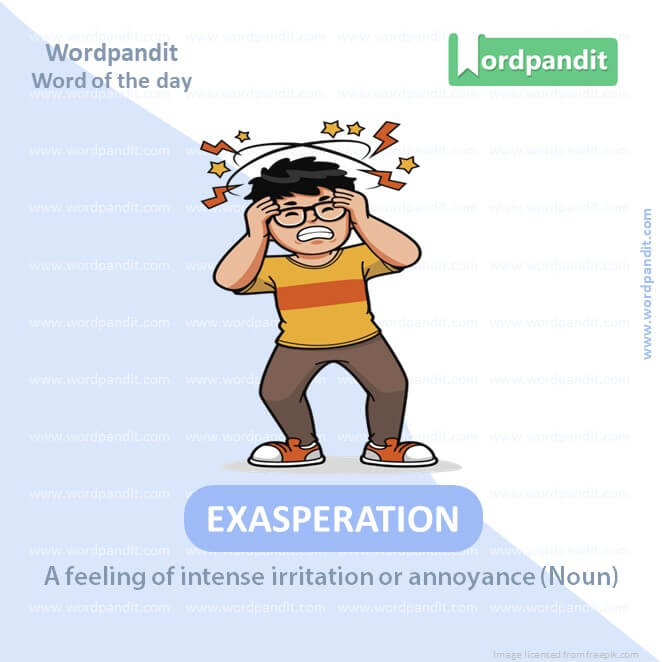
WORD-1: EXASPERATION
CONTEXT: The prime minister defends himself in a tone of wheedling exasperation that barely conceals impatience with a nation that refuses to recognise the tireless work he is doing on its behalf.
SOURCE: The Guardian
EXPLANATORY PARAGRAPH: Imagine you’re trying to tie your shoelaces but they just keep coming undone. You might feel really, really annoyed and want to say, “Oh, come on!” That feeling of being super annoyed and almost out of patience is called “exasperation.”
MEANING: A feeling of intense irritation or annoyance (Noun).
PRONUNCIATION: Ex-as-peh-ray-shun
SYNONYMS: Frustration, irritation, annoyance, aggravation, vexation, impatience.
USAGE EXAMPLES:
1. Her exasperation was evident when she couldn’t solve the puzzle.
2. “Why won’t this work?” he shouted in exasperation.
3. She sighed in exasperation when her brother spilled juice on her drawing.
4. The teacher’s exasperation grew as the students continued to ignore her instructions.
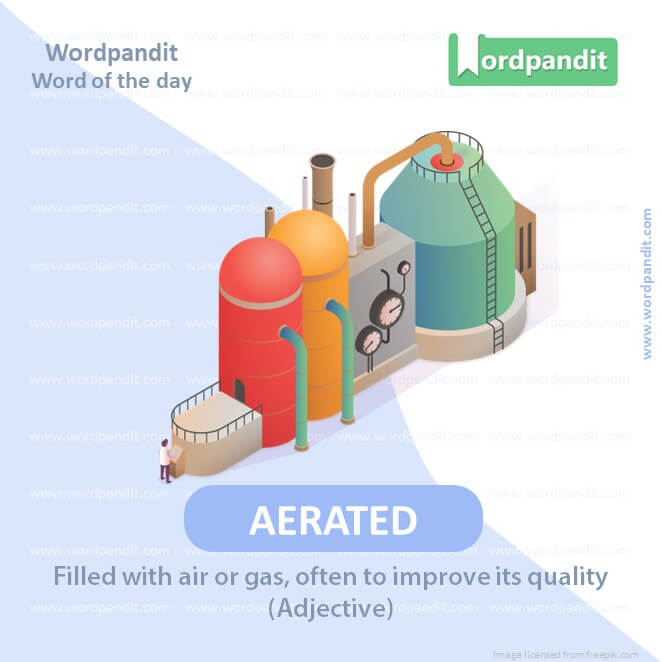
WORD-2: AERATED
CONTEXT: It is true that she didn’t install aerated concrete in any roofs herself, nor did she personally cut the funds that might have gone on non-crumbly replacements (a defence unavailable to Sunak since he wielded the knife as chancellor).
SOURCE: The Guardian
EXPLANATORY PARAGRAPH: Imagine you have a flat basketball. It’s no fun to play with, right? You fill it up with air to make it bouncy and ready for the game. When something has air put into it, like your basketball, we say it’s “aerated.”
MEANING: Filled with air or gas, often to improve its quality (Adjective).
PRONUNCIATION: Air-ay-ted
SYNONYMS: Oxygenated, carbonated, ventilated, aired, fizzed, bubbly.
USAGE EXAMPLES:
1. The aerated drink was very bubbly and refreshing.
2. The farmer aerated the soil to help the plants grow better.
3. This fountain is aerated to keep the water clean.
4. She prefers aerated water to still water.
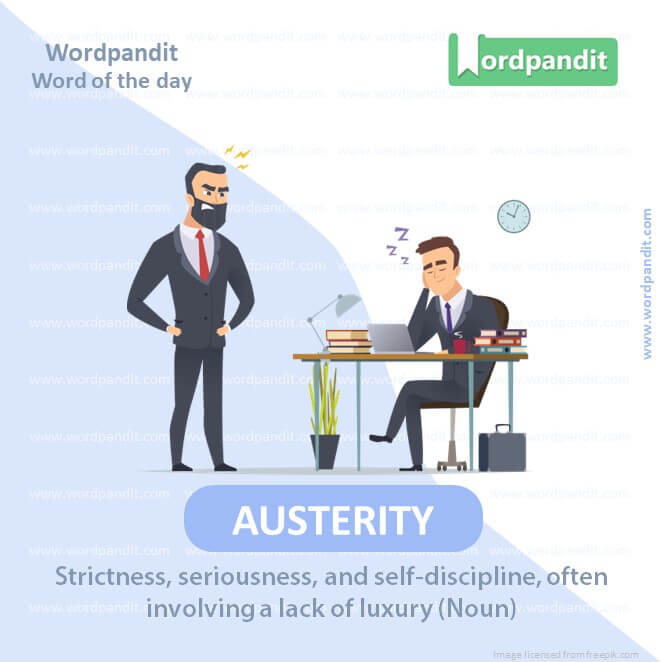
WORD-3: AUSTERITY
CONTEXT: But that is no defence if the underlying problem was an austerity programme that degraded public services in exchange for, at best, marginal and short-lived gains in deficit reduction.
SOURCE: The Guardian
EXPLANATORY PARAGRAPH: Imagine you have a lot of toys but decide to play with just one or two and keep everything else super simple. That’s like “austerity.” It means being very plain and not using anything extra or fancy.
MEANING: Strictness, seriousness, and self-discipline, often involving a lack of luxury (Noun).
PRONUNCIATION: Os-ter-ih-tee
SYNONYMS: Severity, strictness, frugality, simplicity, restraint, asceticism.
USAGE EXAMPLES:
1. The monastery was a place of austerity and meditation.
2. The government introduced austerity measures to reduce debt.
3. She lived a life of austerity, saving every penny she could.
4. The room was decorated with austerity, only containing the essentials.
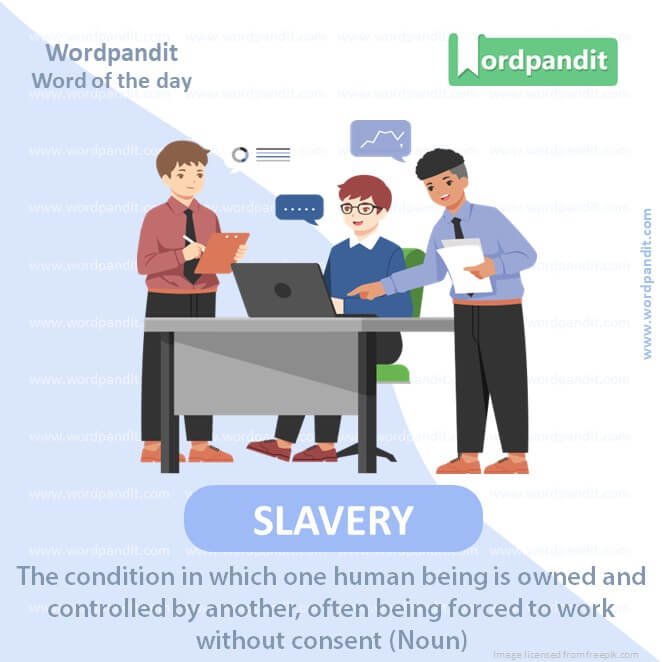
WORD-4: SLAVERY
CONTEXT: The UK is recognised in the Global Slavery Index as tougher on modern slavery, but while nearly 23,000 potential victims were identified in Britain from 2017 to 2019, only 64 offenders were sentenced for modern slavery and human trafficking offences under the Modern Slavery Act.
SOURCE: The Guardian
EXPLANATORY PARAGRAPH: Slavery is a very, very bad thing where some people are treated like objects and have to work very hard without being asked if they want to or not. It’s not fair and it’s not right.
MEANING: The condition in which one human being is owned and controlled by another, often being forced to work without consent (Noun).
PRONUNCIATION: Slay-ve-ree
SYNONYMS: Bondage, servitude, oppression, subjugation, thralldom, captivity.
USAGE EXAMPLES:
1. Slavery was abolished in the United States in 1865.
2. Human trafficking is a modern form of slavery.
3. The history of slavery is a dark chapter in human civilization.
4. Her ancestors suffered the hardships of slavery.
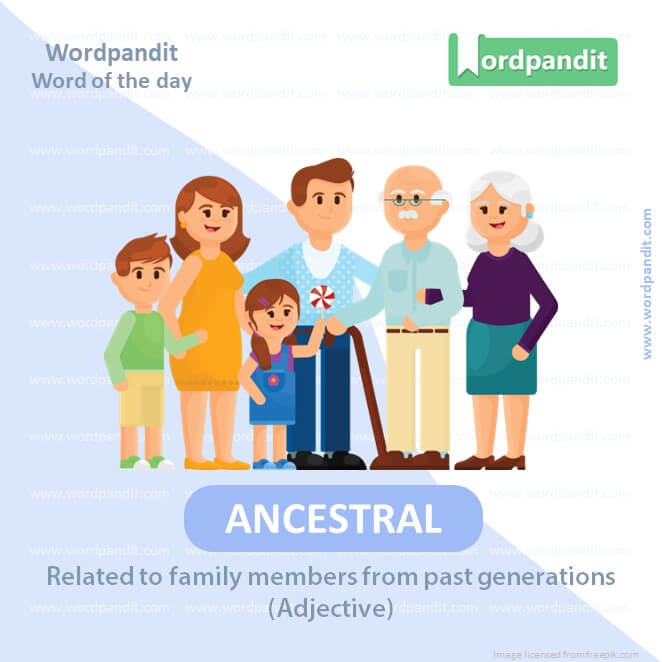
WORD-5: ANCESTRAL
CONTEXT: How about laws like Israel’s that deny Palestinians even the right to mourn the loss of ancestral homes and land or seek to reclaim them?
SOURCE: Al Jazeera
EXPLANATORY PARAGRAPH: Think about your family tree, where you have your mom and dad, and they have their moms and dads, and so on. When something is “ancestral,” it means it comes from your family that lived a long, long time ago.
MEANING: Related to family members from past generations (Adjective).
PRONUNCIATION: An-ses-truhl
SYNONYMS: Hereditary, familial, lineage-based, forefatherly, genealogical, traditional.
USAGE EXAMPLES:
1. The ancestral home had been in the family for generations.
2. They followed ancestral traditions during the holiday.
3. He wore an ancestral heirloom at his wedding.
4. Ancestral stories were passed down through generations.
WORD-6: MISERABLY
CONTEXT: It is time to protect the lands and livelihoods of small-scale farmers and end the sort of corporate-driven, top-down development that has failed so miserably.
SOURCE: Al Jazeera
EXPLANATORY PARAGRAPH: Imagine you try to build a sandcastle but it keeps falling down and you feel really sad about it. When you’re very, very unhappy or something doesn’t go well at all, that’s when you say it’s “miserably” done or you feel “miserably” sad.
MEANING: Extremely unhappily, or in a manner that fails very badly (Adverb).
PRONUNCIATION: Miz-er-uh-blee
SYNONYMS: Woefully, wretchedly, poorly, terribly, lamentably, unhappily.
USAGE EXAMPLES:
1. She failed the test miserably.
2. I felt miserably sick all day.
3. He played the game miserably and lost.
4. The project miserably missed its deadline.
WORD-7: GNAWING
CONTEXT: As the laugh escaped her lips, I imagined her spad silently gnawing through his entire fist in the green room.
SOURCE: The Guardian
EXPLANATORY PARAGRAPH: Imagine a little mouse nibbling on a piece of cheese. It keeps biting and biting it. That’s like “gnawing.” It can also be like a worry that keeps bothering you in your mind.
MEANING: Biting or chewing repeatedly, often creating discomfort or anxiety (Verb).
PRONUNCIATION: Naw-ing
SYNONYMS: Nibbling, chewing, eroding, corroding, eating away, worrying.
USAGE EXAMPLES:
1. The dog was gnawing on a bone.
2. A gnawing pain kept him awake at night.
3. Her gnawing worry made it hard to focus.
4. Rats had been gnawing at the wires.
WORD-8: BUNGLING
CONTEXT: Parallels were drawn between Keegan and The Thick of It’s bungling secretary of state Nicola Murray.
SOURCE: The Guardian
EXPLANATORY PARAGRAPH: Imagine you’re trying to build a tower of blocks, but they keep falling over because you’re not putting them carefully. When you do something clumsily and mess it up, that’s called “bungling.”
MEANING: Handling things clumsily or ineffectively, often resulting in mistakes (Verb).
PRONUNCIATION: Buhn-gling
SYNONYMS: Blundering, botching, fumbling, messing up, muddling, screwing up.
USAGE EXAMPLES:
1. The bungling thief was caught easily by the police.
2. He was fired for bungling important tasks.
3. Her bungling attempts at cooking made everyone laugh.
WORD-9: SORGHUM
CONTEXT: CATSP focuses on supporting farmers growing maize and soybeans, along with other export crops, at the expense of the more diverse food crops grown by Zambian farmers, such as millet and sorghum.
SOURCE: Al Jazeera
EXPLANATORY PARAGRAPH: Sorghum is a type of plant that farmers grow in fields. People use it to make things like syrup and flour. It’s really tall and has grains at the top that can be used for many things.
MEANING: A type of grain plant used for food, fodder, and the production of alcoholic beverages (Noun).
PRONUNCIATION: Sor-guhm
SYNONYMS: Grain, cereal, milo, crop, forage, feedstuff.
USAGE EXAMPLES:
1. Sorghum is a staple food in many countries.
2. The farmer planted sorghum in the southern field.
3. Sorghum syrup is a natural sweetener.
4. The livestock were fed sorghum during the winter.
WORD-10: MILLET
CONTEXT: CATSP focuses on supporting farmers growing maize and soybeans, along with other export crops, at the expense of the more diverse food crops grown by Zambian farmers, such as millet and sorghum.
SOURCE: Al Jazeera
EXPLANATORY PARAGRAPH: Millet is a type of tiny grain that people can eat. It grows on a plant and can be used to make things like bread or cereal. Some birds really like to eat it too!
MEANING: A small-seeded grain that is cultivated as food for humans and feed for livestock (Noun).
PRONUNCIATION: Mill-it
SYNONYMS: Grain, cereal, seed, crop, feed, forage.
USAGE EXAMPLES:
1. Millet is a common ingredient in birdseed.
2. Some cultures use millet to make traditional dishes.
3. The farmer decided to grow millet this season.
4. She made a millet salad for lunch.
Vocabulary Sentence
One of the most effective strategies in language learning is grasping the concept of ‘vocabulary sentence’. A ‘vocabulary sentence’ means using a new word in a sentence. The process not only helps to understand the new term’s meaning and usage but also reinforces its memory by providing context. Therefore, learning ‘vocabulary sentence’ is central to mastering any language.
The initial step towards ‘vocabulary sentence’ learning is to identify common but flexible words that you can use across various contexts. Then, you can form sentences using these words in different situations, thereby learning their versatility and applicability.
Next, reading plays a significant role in learning ‘vocabulary sentence’. Reading diverse materials helps you encounter new words within a sentence, providing a more precise understanding of their meaning and grammatical structure. This exposure to naturally occurring ‘vocabulary sentence’ facilitates a more intuitive grasp of language.
Creating your ‘vocabulary sentence’ using new words is a hands-on approach to ensure a stronger memory. Writing or speaking sentences with a new word helps you actively engage with the language process, which aids deep and long-lasting learning.
Another effective method to practice ‘vocabulary sentence’ is through flashcards. Write the new word on one side, and on the other side, write a ‘vocabulary sentence’ using that word. It enhances both your understanding and recall of the new vocabulary.
Finally, repetition plays a critical role in mastering ‘vocabulary sentence’. The more you use new words in a sentence, the more familiar they become, and the better grasp you have on their usage and context.
In conclusion, ‘vocabulary sentence’ learning is a strategic and effective approach to language acquisition. By actively creating sentences with new words, reading widely, and using flashcards, you can master ‘vocabulary sentence’ use, eventually leading to substantial vocabulary growth and language proficiency.







